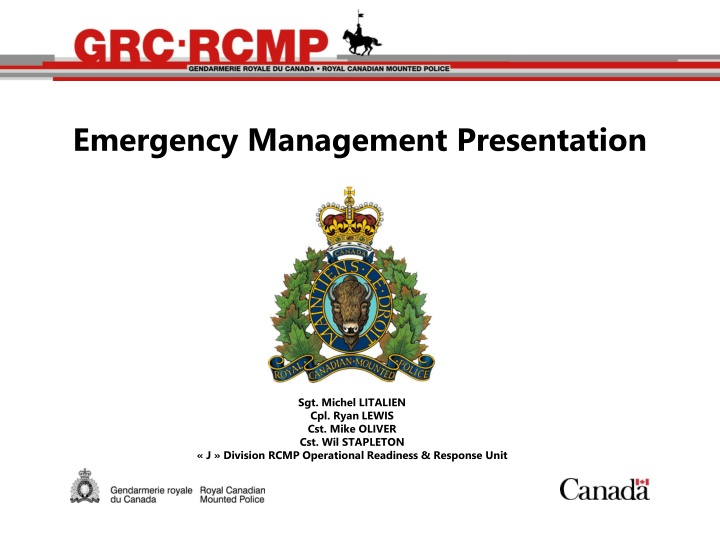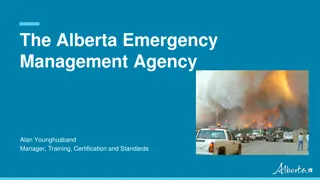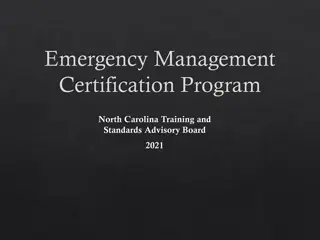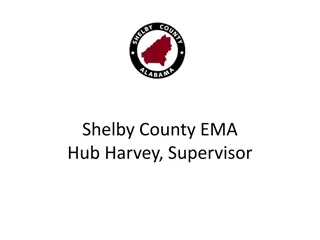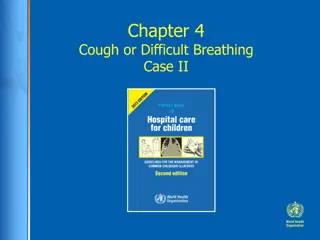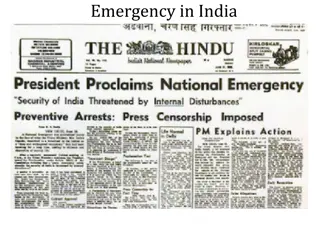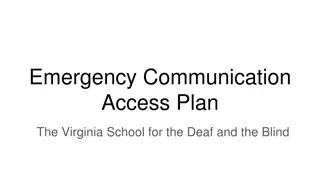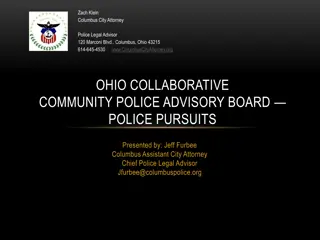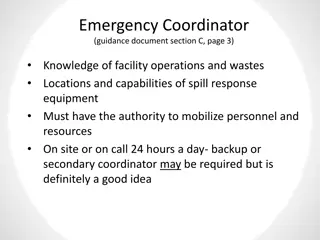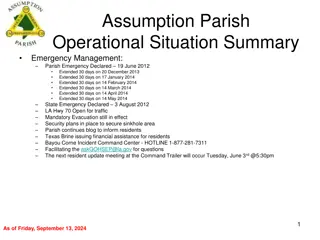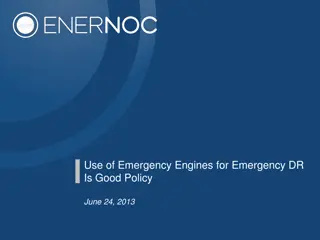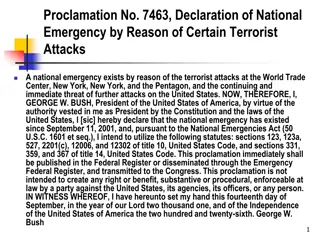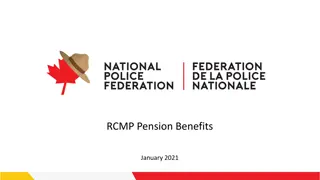RCMP Emergency Management Overview
The Royal Canadian Mounted Police (RCMP) boasts a comprehensive Emergency Management (EM) Program aimed at enhancing its operational readiness and response to all-hazards emergencies. The program includes components such as National Emergency Planning, Incident Management System, and Best Practices. The Operational Readiness & Response (ORR) Division at both Division and National levels serves as the core for emergency management activities within the RCMP, ensuring a coordinated and timely response to emergencies. Additionally, the Critical Incident Program (CIP) equips the RCMP with necessary teams and resources to handle critical incidents, emergencies, and disasters.
Download Presentation

Please find below an Image/Link to download the presentation.
The content on the website is provided AS IS for your information and personal use only. It may not be sold, licensed, or shared on other websites without obtaining consent from the author.If you encounter any issues during the download, it is possible that the publisher has removed the file from their server.
You are allowed to download the files provided on this website for personal or commercial use, subject to the condition that they are used lawfully. All files are the property of their respective owners.
The content on the website is provided AS IS for your information and personal use only. It may not be sold, licensed, or shared on other websites without obtaining consent from the author.
E N D
Presentation Transcript
Emergency Management Presentation Sgt. Michel LITALIEN Cpl. Ryan LEWIS Cst. Mike OLIVER Cst. Wil STAPLETON J Division RCMP Operational Readiness & Response Unit
Advanced Warning No Advanced Warning
EM Program Emergency Management Program (EM) Is responsible for creating a standardized framework that enables the RCMP to increase its capability and to mount emergency response operations to all-hazards emergencies and / or disasters through advanced planning. The EM Program is comprised of the following components: National Emergency Planning; National Exercise Coordination; National Business Continuity Planning (BCP) Policy; Incident Management System; Best Practices and Lessons Learned
RCMP ORR Operational Readiness & Response (ORR) Division Level ORR provides a central point of contact within the Division for emergency management and incident response across within the RCMP. National Level ORR has a central secretariat at HQ in Ottawa which works with those on the operational front across the country to provide a coordinated and timely response to any emergency.
OIC Specialized Policing Services (SPS) Forensic Identification Services (FIS) Critical Incident Program S/Sgt. Tactical Traffic Unit Indigenous Policing OCC Risk Managers ICREW/CPO s RPAS Program ERT ORR PDS NBEMO Liaison Activation & Exercising Division Emergency Operations Centre DEOC Critical SAFE Plans Schools Action for Emergencies Business Continuity Planning Division EOP s & SOP s CBRN FRP (Gas Masks) GSAR Infrastructure Program REOC Incident Command Posts P-100 Exercise Programs International Airports NB Power Gas Pipelines Activation & Exercising Respirators MEOC Activation & Exercising
CIP Critical Incident Program (CIP) CIP provides and maintains teams and resources to ensure RCMP readiness, response and management of critical incidents, emergencies and disasters by providing Chemical Biological Radiological Nuclear Explosives (CBRNE) Emergency Medical Response Teams (EMRT) Emergency Response Team (ERT) Negotiator (NEG) Public Order Team (STO) Remotely Piloted Aerial Systems (RPAS)
Police Force of Jurisdiction Response Police Force of Jurisdiction (POJ) Response Members are Dispatched to Scene First Member to arrive established Command & Control (Incident Command). Member provided situational awareness to Team Leader, OPS NCO or OCC Risk Manager. If the scope of response required exceeds District Capacities, or requires Specialized Teams/Resources, the OCC Risk Manager will contact the On Call Critical Incident Commander (CIC), who has the authority to activate the CIP Package as required. If CIP is activated, the CIC become the Incident Commander.
DEOC 24/7 Division Emergency Operations Centre (DEOC) Coordinate and integrate preparedness and response activities within the Division required for the RCMP to protect the health, safety, security and economic well-being of all employees and residents during an impending (threating) event or an all-hazard civil emergencies. These activities carry over to, and directly support the day-to-day police operations
NOC 24/7 RCMP National Operations Centre (NOC) A fully secure and integrated command and control centre for centralized monitoring and co-ordination during critical incidents and major events. NOC is the principal contact point between the RCMP and key national and international partners during periods of crisis and emergencies. It is responsible for the continued functioning and enhancement of multi-departmental working groups involved in national security and counter-terrorist plans, and for the communication of time-sensitive tactical and strategic information and intelligence. Key Responsibilities The NOC operates 24/7/365 to monitor and coordinate the RCMP's official response to airborne incidents, major events, natural disasters, incidents involving national security, and other crisis that could affect the safety or well being of Canadians and/or our members. It is an integral part of the Canadian government's emergency response plans, and acts as the principal contact point between the RCMP and its national and international crisis management partners.
GOC Government of Canada Operations Centre (GOC) The Government Operations Centre (GOC) provides an all-hazards integrated federal emergency response to events (potential or actual, natural or human-induced, accidental or intentional) of national interest. It provides 24/7 monitoring and reporting, national-level situational awareness, warning products and integrated risk assessments, as well as national-level planning and whole-of-government response management. During periods of heightened response, the GOC is augmented by staff from other government departments/agencies (OGD) and non-governmental organizations (NGO) who physically work in the GOC and connect to it virtually.
Structure - MEOC Localized Event - REOC Regional Event - PEOC Provincial Event - DEOC RCMP Divisional Event - NOC RCMP National Event - GOC Federal Event
PEOC & RCMP LEVEL 1: ENHANCED MONITORING DOES NOT REQUIRE RCMP ATTENDANCE, BUT MAY REQUIRE PARTICIPATION IN TELECONFERENCE. A level 1 response is a continuous monitoring and reporting of an emerging situation or an emergency that does not require provincial control.
LEVEL 2: PARTIAL ACTIVATION - REQUIRES RCMP ATTENDANCE A level 2 response requires selected critical members of the PEOC to remain at the PEOC to assist in the management of the response. - The Member will contact the District that is impacted by the event. The Member will provide an explanation of our PEOC Liaison role and contact information. - The Member will request a Liaison contact from the District. - The Member will request the following be provided to the PEOC Liaison at designated timings (prior to PEOC briefings): - Health & Safety of our Members. - Situational Awareness and Primary Objectives. - Resources. - Wants/Needs.
LEVEL 3: FULL ACTIVATION - A level 3 response is one that is sufficiently serious to require a whole of government response, and requires all members of the PEAC to be actively engaged. - The Member set priorities, assign tasks and coordinate operations for his/her respective department. - The Member will undertake such planning as is necessary to coordinate future phases of the operation, such as evacuation or recovery. - This may require two (2) members present. - Events warranting ORR participation: Weather related events
GSAR & PDS - Police Dog Services (PDS) dispatched for all missing persons files PDS liaise with the POJ & GSAR for coordinated efforts PDS program coordinator conducts yearly evaluations of civilian search dog teams. - -
